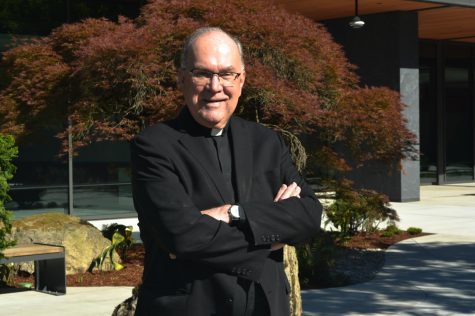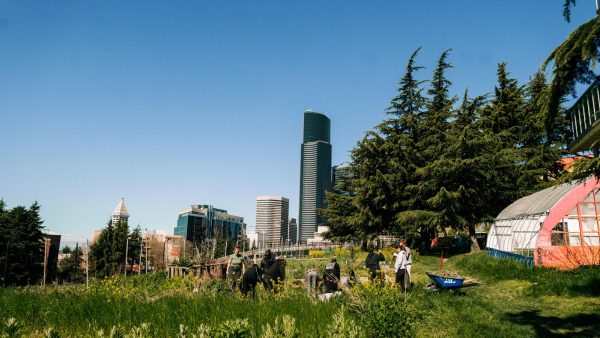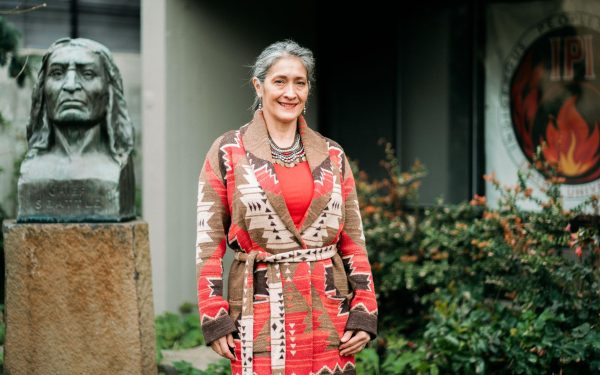Kilowatts for Humanity Striving Toward Engineering Equity
Seattle University faculty have partnered with Kilowatts for Humanity (KWH), a volunteer nonprofit that works in tandem with local companies in Sub-Saharan Africa to provide renewable energy to underserved communities. KWH was founded by three Seattle U faculty members: Director of the Office of Sponsored Projects Jenna Isakson, former Adjunct Professor Steve Szablya and Henry Louie, a professor of electrical and computer engineering. Every year, KWH partners with a team of Seattle U students to work on technical projects related to data acquisition.
“I was inspired by the passion of Louie, Steve Szablya and the students at Seattle U who had already been doing projects on a smaller scale,” Jenna Isakson, co-founder of KWH and director of the Office of Sponsored Projects at Seattle U said. “They motivated me to see how much more of an impact we could have if we really organized around this effort and brought everyone’s passions and expertise together.”
This year, the team is comprised of four Seattle U students: electrical and computer engineering fourth-years Adrian Rivera, My-Loan Tran and Brian Phuong and fifth-year electrical engineering and physics double major Caleb Malaer. In the past, the student teams have worked to establish energy kiosks that allow for the use of electricity in homes and businesses. Throughout the end of the academic year, they will be working closely with KWH. The team will be building off of last year’s project which involved setting up O-GLAD, an off-grid analyzing loading device that allowed them to determine the energy needs of different communities. This year, Electrical and Computer Engineering Professor Agnieszka Miguel is overseeing the team’s capstone project, which involves collecting data to build a profile for specific businesses and homes.
“Up until this point, knowing how much energy the device is going to use over the course of the day has been subject to a lot of assumptions and guesswork. Knowing confidently how much power and energy something is going to use lets us rightsize our power systems,” Daniel Nausner, Seattle U alumnus and co-lead of the microgrid team for KWH, said. “In turn, it makes it easier for us to keep our promises.”
Malaer and his team seek to use their knowledge and expertise to empower local companies in the Sub-Saharan region to create viable businesses.
“In the 21st century, access to electricity is a huge deal. People who don’t have consistent or easy access to electricity may struggle to lift themselves out of poverty and connect with the rest of the world,” Malaer said.
Founded in 2015 as an offshoot of Engineers Without Borders, KWH’s mission is to improve people’s lives by providing access to electricity and fostering the development of sustainable businesses. Louie’s continued connection with Seattle U provided an opportunity for students to use KWH as their senior capstone project while simultaneously making a difference. One tenet of KWH’s mission is working with local businesses and organizations to install and make use of renewable energy. This allows communities to decide what their energy needs are, meeting them and identifying new communities that could benefit from KWH’s work and creating jobs.
“One of our values is around capacity building for the communities we work in,” Isakson said. “We are never the ones to actually install the solar panels ourselves, we’ll hire local contractors.”
This year’s team is the most recent in a long partnership between KWH and Seattle U. Nausner had the opportunity to be a part of one of the first teams to work with KWH and has seen the organization evolve and grow over the years. He and his colleagues at KWH are excited to build on the work they have started and keep striving toward service.
“It’s humbling to go overseas and live without electricity and then come back and see just how casually we use electricity and power here,” Nausner said. “We take it for granted that the power is going to stay on and that things are going to work. That’s a luxury that we have.”
While KWH is a relatively new organization, its passion for renewable energy and service is not. Through its partnership with Seattle U, KWH has plans to expand its work in Sub-Saharan Africa in an effort to build a more equitable world where access to electricity is a reality.











